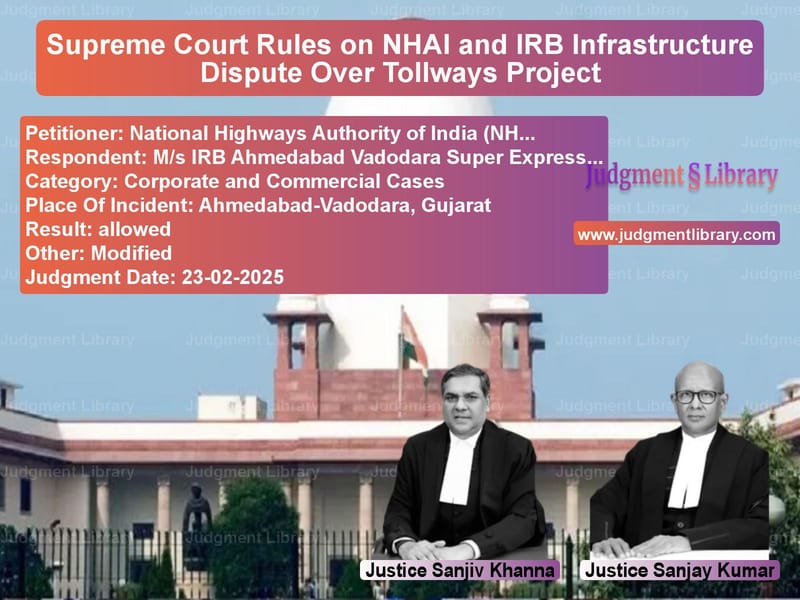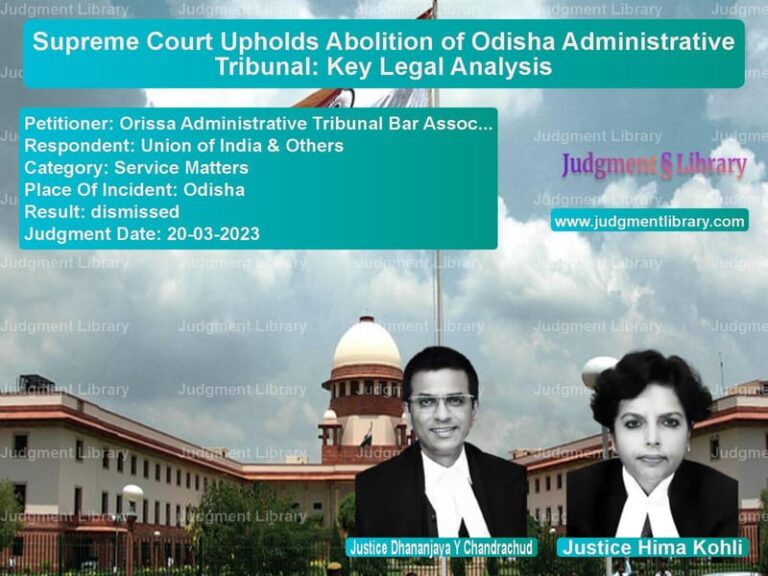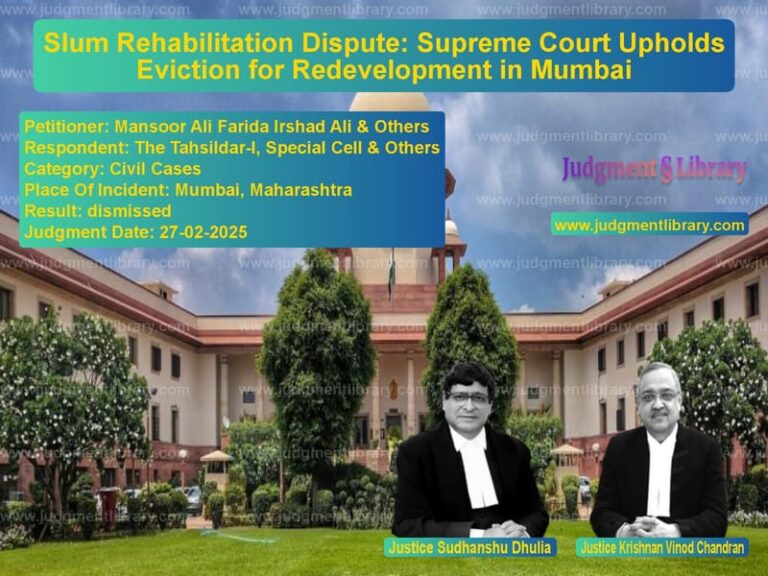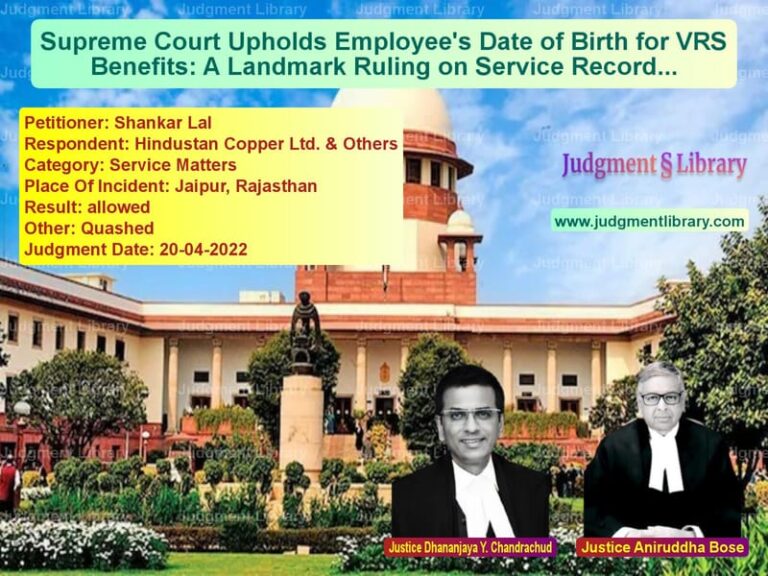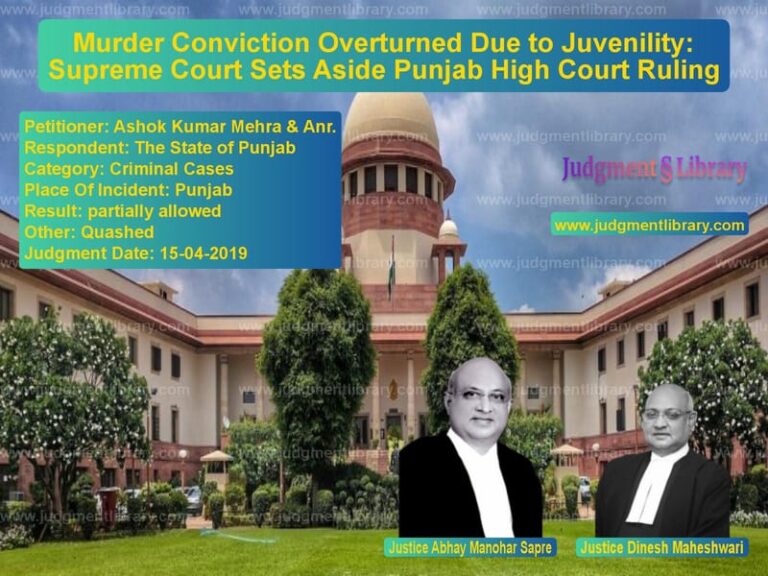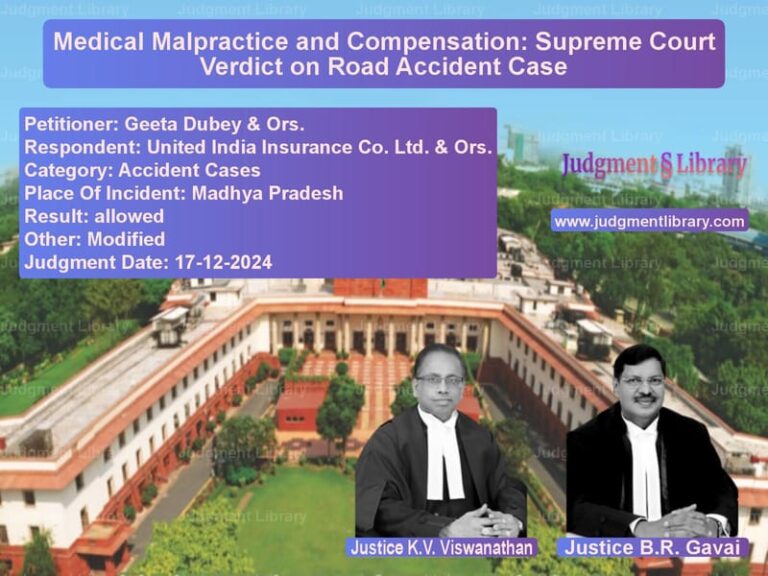Supreme Court Rules on NHAI and IRB Infrastructure Dispute Over Tollways Project
The Supreme Court in the case of National Highways Authority of India (NHAI) vs. M/s IRB Ahmedabad Vadodara Super Express Tollways Pvt. Ltd. addressed multiple issues concerning the execution of contractual obligations in a highway infrastructure project. The judgment is crucial for understanding the judicial approach to contract enforcement in public infrastructure projects.
Background of the Case
The case stems from a dispute between NHAI and IRB Infrastructure regarding contractual obligations related to a highway tollway project between Ahmedabad and Vadodara. NHAI, the government agency responsible for national highways, and IRB Infrastructure, a private tollway developer, were in disagreement over the implementation and financial obligations under their agreement.
Key issues in the case:
- The applicability of Order XXXVIII Rule 5 of the Code of Civil Procedure (CPC), 1908, which deals with the attachment of property before judgment.
- Execution proceedings related to financial disputes between the parties.
- The validity of observations made by the lower court regarding contractual breaches.
Legal Proceedings and High Court Ruling
The dispute was initially adjudicated in the High Court, which ruled in favor of IRB Infrastructure on three key issues. The High Court directed that certain contractual obligations should be enforced, impacting NHAI’s financial liabilities. Aggrieved by this, NHAI approached the Supreme Court.
Arguments Before the Supreme Court
Petitioner’s (NHAI) Arguments
NHAI’s legal counsel contended:
- The High Court erred in its application of Order XXXVIII Rule 5 CPC, which concerns the attachment of property before judgment.
- The financial obligations imposed on NHAI were excessive and beyond the contractual terms.
- The High Court’s findings on contractual breaches were outside its jurisdiction.
- Execution proceedings were improperly considered in the lower court’s judgment.
Respondent’s (IRB Infrastructure) Arguments
IRB’s legal counsel defended the High Court’s decision, arguing:
- The financial liabilities determined by the High Court were justified based on contractual terms.
- NHAI was seeking to evade legitimate obligations under the agreement.
- The lower court’s findings were based on substantial evidence.
- The execution proceedings were necessary to ensure enforcement of contractual terms.
Supreme Court’s Observations
The Supreme Court bench, comprising Chief Justice Sanjiv Khanna and Justice Sanjay Kumar, reviewed the case and made the following key observations:
“The applicability of Order XXXVIII Rule 5 CPC must be based on substantive grounds and not merely on apprehensions of non-compliance. The High Court’s approach on this issue does not require interference. However, its findings on other contractual matters are not binding and must be reconsidered.”
The Court further clarified:
- The High Court’s ruling on Order XXXVIII Rule 5 CPC remains intact.
- However, the Supreme Court erased portions of the High Court’s judgment related to execution proceedings and contractual observations.
- Future legal proceedings on execution and financial matters remain open for adjudication.
Final Judgment
The Supreme Court ruled:
- The appeal was disposed of without modifying the ruling on Order XXXVIII Rule 5 CPC.
- The High Court’s findings from paragraphs 28.1.7 to 28.3 were erased.
- The decision does not impact any pending execution proceedings initiated by NHAI.
Key Takeaways
- Limited Applicability of Order XXXVIII Rule 5 CPC: The judgment clarifies that property attachment before judgment must be substantiated with strong evidence.
- Judicial Oversight in Infrastructure Disputes: The Court ensures that contractual disputes between public and private entities are fairly adjudicated.
- Erasure of Contractual Observations: The ruling prevents unnecessary legal conclusions that might impact future proceedings.
Conclusion
The Supreme Court’s judgment reinforces the principle that public infrastructure contracts require judicial scrutiny but must adhere to established procedural safeguards. The decision ensures that both NHAI and IRB Infrastructure can seek further legal remedies where necessary.
Petitioner Name: National Highways Authority of India (NHAI).Respondent Name: M/s IRB Ahmedabad Vadodara Super Express Tollways Pvt. Ltd..Judgment By: Justice Sanjiv Khanna, Justice Sanjay Kumar.Place Of Incident: Ahmedabad-Vadodara, Gujarat.Judgment Date: 23-02-2025.
Don’t miss out on the full details! Download the complete judgment in PDF format below and gain valuable insights instantly!
Download Judgment: national-highways-au-vs-ms-irb-ahmedabad-va-supreme-court-of-india-judgment-dated-23-02-2025.pdf
Directly Download Judgment: Directly download this Judgment
See all petitions in Company Law
See all petitions in Contract Disputes
See all petitions in Specific Performance
See all petitions in Damages and Compensation
See all petitions in Judgment by Sanjiv Khanna
See all petitions in Judgment by Sanjay Kumar
See all petitions in allowed
See all petitions in Modified
See all petitions in supreme court of India judgments February 2025
See all petitions in 2025 judgments
See all posts in Corporate and Commercial Cases Category
See all allowed petitions in Corporate and Commercial Cases Category
See all Dismissed petitions in Corporate and Commercial Cases Category
See all partially allowed petitions in Corporate and Commercial Cases Category

